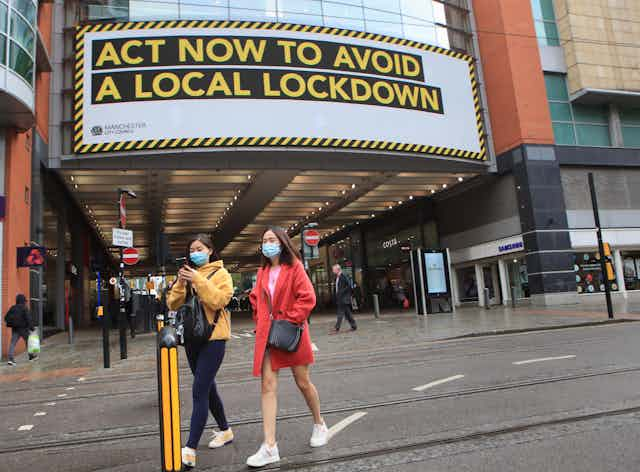As COVID-19 cases have risen sharply in large parts of the north of England, local leaders have united to challenge government policy.
Representatives from across the north have come together questioning the government’s decision to impose local lockdowns in their region. They have particularly criticised central government for failing to provide enough funding to cope with the economic impacts of lockdown and the lack of financial support for people unable to work.
Pan-northern cooperation is not entirely new – in recent years, leaders across the north have increasingly attempted to speak for the region as a whole, as well as their own particular areas. However, the way in which northern disquiet has manifested itself in recent weeks does seem to point towards an evolution of local politics.
There appears to be a hardening of northern resolve. Local leaders are no longer hiding the frustrations and have been open about their anger over the way decisions are being made in London. Andy Burnham, mayor of Greater Manchester, has vowed not to “surrender” the people of the north to “hardship”.
Across the Pennines, Dan Jarvis, the mayor of Sheffield City Region and MP for Barnsley Central, has invoked the governent’s own rhetoric of “levelling-up”. This was a key component of Boris Johnson’s 2019 election campaign, with promises to regenerate the North potentially playing a part in his success in northern constituencies. Jarvis has warned that the government’s approach to the pandemic in the North of England risks the region being “levelled down”.
While the most vociferous protestations have come from Labour party figures, there are signs that this idea that the north is being treated unfairly by government is now being felt by northern representatives on all sides.
There’s been notable disquiet from a number of Conservative MPs across the region. Meanwhile, the Conservative leader of Bolton Council, David Greenhalgh, has questioned the government’s new financial support package for those in areas under local lockdown, asking “why should the north be treated any different to the rest of the country?”
If they worked together on a sustained basis, northern political leaders could exert more pressure on central government to ensure it delivers on its commitments to the north and have a greater say in shaping and enacting policy for the region.
Divide and conquer?
There are certainly early signs that the frustrations felt across the north in recent weeks may be significant, but there are also plenty of challenges that a burgeoning northern regionalism would have to overcome.
As northern leaders speak up, we can expect to see central government attempting to push back. Westminster already has a tendency to stoke a sense of competition rather than cooperation within the north. It has been argued that its “top-down” approach to devolution across the region is driven by this agenda.

Similar tactics appear to be in evidence during the pandemic too. The government is seeking to divide the pan-northern consensus that has developed around COVID-19 by attempting to co-opt local leaders into the process of introducing local restrictions without necessarily involving them in the decision-making process. When announcing Liverpool City Region was moving into tier 3 lockdown restrictions, Johnson implied that the government had worked with Liverpool City Region’s mayor, Steve Rotheram, to determine the exact details of the restrictions – an assertion that was denied by Rotheram.
In the longer term it may be that, without the spectre of the coronavirus pandemic, pan-northern cooperation falters. Of course, there will always be divides along party political lines, but it is also important to remember that, despite commonalities across large swaths of it, the north of England is a big area. Different parts of the region have distinct identities, political traditions and economic needs.
But the cooperation of recent weeks has given northern leaders a higher profile than ever. Metropolitan mayors and other leaders across the north have had the opportunity to set out their concerns for the region. Now they could continue to work together to set out and champion a more positive vision for the north’s future.
A new regionalism for the north
Rather than hoping for support from London, local leaders in the north could make more of a habit of taking matters into their own hands to form, organise and develop a bottom-up regionalist agenda.
Civic groups such as The People’s Powerhouse could play a key role here. And from a party-political perspective, while there are regionalist parties for Yorkshire and the north-east, there is not currently a pan-northern regionalist party. Advocates of a northern regionalism might seek to fill this gap.
Within the main two party’s there is much potential for a northern regionalist agenda to emerge. Local Labour figures already cooperate but they could go further. Perhaps it could now be time for a distinct “Northern Labour” brand to be developed and organised more fully.
On the Conservative side, a group of MPs has now formed the Northern Research Group, inspired by the successes of the European Research Group, which has become extremely influential in Brexit policy. As the group was announced, its leader Jake Berry, the former Northern Powerhouse minister, reminded his colleagues “we don’t form a government unless we win the north.”
This may prove to be significant if northern Conservative MPs take up collective positions on government policy, acting jointly in what they perceive to be in the best interests of the north as a whole.
Given the role of the north of England as a key battleground at the general election last year and the current focus on the region as a result of the pandemic, it is hard to see it falling down the political agenda any time soon. While a northern regionalist agenda is by no means fully formed at the moment, local figures are clearly seeing an opportunity to bolster their influence.

